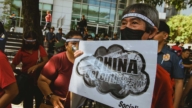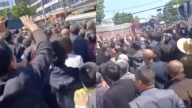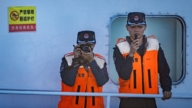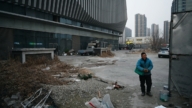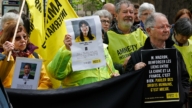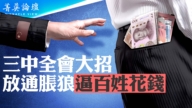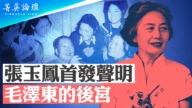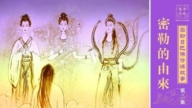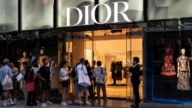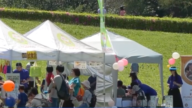【新唐人2012年12月25日訊】近年來,大陸警民矛盾日益惡化,各地警民衝突不斷,針對這種情況,中國人民公安大學宣佈成立了「警察公共關係研究中心」,專門培養所謂公關警察。中心負責人聲稱,設立中心目地在和諧警民關係。但警民矛盾的癥結在哪兒﹖評論認為,中共首先要改變暴力維穩的手段。也有警察認為,中國當局製造新的犯罪活動來掩蓋舊的冤案,冤案只會越來越嚴重,因此警民難和諧!
據大陸媒體報導,「中國人民公安大學警察公共關係研究中心」12月22號在北京正式成立。據了解,這個中心將於2013年起招收公共關係警察研究生,培養高端的「公關警察」。
公關中心負責人孫娟對媒體說,中心成立的主旨在通過公關課程的培訓,推動促進警民關係的「和諧發展」。但有評論人士認為,大陸現在的警民關係,並非學點公關技巧就能改善的,警察缺乏的並不是表面上的理論知識。
北京時政觀察人士華頗:「因為這些年來暴力維穩使警察公關形象非常醜陋,人民對警察印象非常惡劣,所以他借鑒了香港有警民公關科等等,想要對警察形象做一種修補,但我認為於事無補。因為要改變警察形象,中共首先要改變暴力維穩的手段,從根本上改變。」
蒙冤警察陳軍育:「它現在這些甚麼公共關係,那都是擺出來的花架子,就是拿出來糊弄你一下,跟本就不會給你解決甚麼實質問題。關鍵是在怎麼樣用實質的行動來處理公共關係,也就是跟廣大的公民在執法活動中產生的一些矛盾該怎麼樣正確的依法依規來處理的問題,實際上,這個根子還是在上面。」
蒙冤上訪的警察陳軍育還指出,其實「警察公共關係部門」在公安局內部早就存在,只不過現在具體化、公開化了,唯一的區別就是由政府部門變成了學術研究機構。他說,其實就是換湯不換藥,完全是紙上談兵。
近年來,大陸社會矛盾加深、暴力執法現象的氾濫,使得各地的大規模警民衝突事件不斷。僅2012年就發生了「廣州清遠千名群眾與數百警察大混戰」、「廣西民眾萬名群眾抗暴」、「廣州中山反恐部隊開槍,發射催淚彈鎮壓萬名四川民工」、「千名軍警與數百回民衝突」等等。在這些警民衝突中,死傷的卻都是中國百姓。
華頗:「因為這社會充滿了不公平、不公正,就會有人出來維護自己的權益,當民眾維護自己的合法權益的時候,警察充當施暴者、打手,來對待民眾的時候,他的形象會好嗎?」
陳軍育表示,冤案子會越來越多,因為訪民一上訪,當局為掩蓋原來的冤案,又製造新的案件,那冤案和侵害群眾利益的事情只會越來越嚴重,根本沒有解決的希望。
陳軍育:「所以我們的上訴、我們的申訴、我們的上訪,他們也同樣會用這種手法——用更多的、更新的、更嚴重的違法犯罪行為,來掩蓋他們的違法犯罪行為,所以那種冤枉的、不公平的、被警察打、罵,甚至被警察投入監獄這種行為,只會越來越多。」
大陸警民矛盾也是官民矛盾的縮影,隨著中共當局的日益腐敗,他們已經成為了中共的私人衛隊。
陳軍育:「(中共)領導下面的公安局簡直和黑社會沒甚麼區別,甚麼罪惡的手段都用上了。他們已經沒有任何的法律意識,他們眼中只有維護自己的利益、維護自己的官位的概念,所以他們已經到了無法無天的地步,更加不要指望他們會為人民服務、會為群眾解決問題,他們現在已經到了完全沒有人性的地步。」
有媒體評論分析,雖然表面上看是警察濫用執法權、以權謀私等因素,造成了警民衝突事件的頻發,但根源還是中共一黨專政,和高壓統治下日益纍積的民怨。
採訪/朱智善 編輯/張天羽 後製/王明宇
Can Public Relations Eliminate Conflict between Police and Public in China?
In recent years, the relationship between police and
civilians in Mainland China has continued to deteriorate.
This has resulted in frequent clashes.
Under this situation, Chinese People’s Public Security
University established the Police Public Relations
Research Center, which specializes in training
the so-called “public relations police.”
The director of the center says that the establishment
is meant to promote “harmony between police and society.”
But what is the source of contention
between the police and the public?
Commentators say that the CCP must first
change its way of maintaining social stability.
Others say that Chinese authorities create new laws
to conceal injustice, causing more and more injustice.
Therefore, it is difficult for police
and society to be harmonious.
Mainland Chinese media reports state that the Chinese
People’s Public Security University established the Police
Public Relations Research Center in Beijing on Dec. 22.
This center will start to recruit graduate students
from 2013, to train professional high-end PR police.
Sun Juan, Director of the PR Research Center told media
that the center is established to promote a “harmonious
development" for the relationship between police and public.
Commentators believe that public relations training will not
be able to solve the current problems in Mainland China.
What the police are lacking is not theoretical knowledge.
Hua Po, Beijing Political critic: “The image of Chinese
police has been very bad in recent years,
because the police resort to violence
to maintain social stability.
So Chinese police have learned from Hong Kong Police to set
up a Public Relations division to improve the image of police.
I believe this is going to be in vain.
To change the image of the police, the CCP must first
fundamentally change violent means of maintaining stability.”
Chen Junyu, a mistreated policeman: “So-called
public relations are little more than a performance.
They are designed to deceive people,
and not to solve any real problems.
The key issue lies in the way they deal with public
relations, that is, whether they can abide by the law in dealing with contention with the public.
The source of the problem is above the level of the police.”
Mistreated policeman and petitioner Chen Junyu also
pointed out that the public relations department has long existed within the Public Security Bureau.
Now it has become an academic and research institution,
without changing the nature of the department.
In recent years there has been increasing social
unrest in Mainland China, together with increasing level of abuse of police power.
Large-scale clashes between the
police and public broke out in 2012.
For example, thousands of local residents fought against
hundreds of policemen in Qingyuan, Guangzhou.
Over ten thousand people rose up
against police violence in Guangxi.
In Guangzhou, anti-terrorism forces fired tear gas
into a group of 10,000 Sichuan migrant workers.
Thousands of military police clashed
with hundreds of Hui minority people.
Many Chinese civilians were injured
or killed during these conflicts.
Hua Po: “When the society is full of injustice,
people will stand out to protect their own interests.
When people defend their legal rights and
interests, police respond with violence.
How can they have a good public image?”
Chen Junyu said more and more criminal cases will appear.
In the face of many petitioners, the authorities
create new crimes to cover up earlier injustices.
There can only be more and more cases that harm
people”s rights and interests, with no hope to solve them.
Chen Junyu: “When people appeal, complain,
or petition, the authorities will respond with more crimes, new and more serious crimes.
As a result, there can only be more cases of innocent
people being unfairly treated, even imprisoned.”
Conflicts between police and the public in Mainland China
reflects the conflicts between government and people.
As the CCP grows ever more corrupt, the
police have become the CCP”s private guard.
Chen Junyu: “There is little difference between
the Public Security Bureau and the gang societies.
They both commit all kinds of evils.
The police show no respect for law, and are only
concerned about personal benefits and power.
They have become absolutely lawless.
Do not expect them to serve the people.
They have entirely lost their humanity.”
Media critics say that although it is apparently the abuse
of police power that causes all the conflicts between
the police and the public, in actuality the clashes lie
in CCP’s one-party dictatorship.
It is the rising number of grievances
under the CCP”s oppressive rule.


